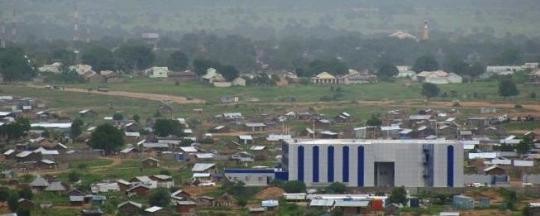South Sudan’s military and National Security Services (NSS) have detained without charge up to dozens of civilians in the Equatoria region, a new report says.
16 civilians have been held in 2015 by South Sudan’s army, some for as long as 3 months, while 20 people have been held by NSS, some for as long as 10 months, a report by the New York-based Human Rights Watch (HRW) said.
Radio Tamazuj previously reported that at least 11 of these people were held in a military site in Nimule, Eastern Equatoria state, but those detentions appear to be part of a broader trend of arresting without charge or disappearing individuals across the Equatoria region.
Authorities have also taken people from Yei, Lainya, Morobo, Juba, and Kajo Keji counties in the Equatoria region and brought to the capital Juba. Some of these detainees have been held in a riverside security service detention site where they said they were kept in “hot, dark, airless cells.” HRW said that people have been beaten or tortured in the campaign of detentions in Equatoria.
Most of the detainees were accused of supporting Equatorian military or political leaders who have joined the armed opposition. None of the people arrested were charged, presented before a judge, or given access to lawyers, in contravention of South Sudan’s transitional constitution, said HRW, which sent a researcher to interview dozens of detainees, relatives, and government officials about the detentions.
On 25 July last year, NSS officers in Kajo Keji arrested Sokiri Felix Wani, a Juba community leader, with his motorcycle taxi driver, Bosco Oce, and two other men, Alison Mogga and Simon Ibansu. They were accused of supporing Alfred Lado Gore, a Central Equatorian politician who joined the armed opposition. Ibansu has been released but the three others remain in NSS detention in Juba.
Three other men, James Ladu Paul, Alex Sandika, and Kenyi Abdu Lopiong, were arrested in mid-2014 in Lainya, Central Equatoria state, also accused of supporting Gore, according to a government official. They also remain in NSS detention.
Further, gunmen arrested Benjamin Taban, a priest, in Morobo, Central Equatoria state, in October. He was still being held in April.
In mid-November, soldiers from the presidential guard detained a journalist for in Juba for three days in the Giyada military intelligence site. He was beaten in detention. His arrest may have been related to his ethnicity. “They asked me what tribe I am, and said if I am Nuer, I must be a follower of Riek Machar,” the journalist told HRW.
In February 2015, a journalist was arrested for taking photographs and detained for about 20 hours in a NSS detention site in the Hai Jalaba neighborhood in Juba, while on 21 March, military intelligence officials arrested a journalist working for South Sudan’s state TV station. He was held him in the in Juba until 10 April.
Also in Juba, in May 2014, military intelligence officials arrested an activist and detained him for three weeks and three days in an underground cell in Giyada. He was told that he was being detained for owning a gun but was never officially charged or provided with any other explanation. Military intelligence officers had earlier threatened him and told him to stop his “peace building” work.
One man, Mawa Malish Isaac, was disappeared completely. Mawa has been missing from Yei, Central Equatoria state after armed men in civilian clothes arrested him on 24 November 2014. Family members said he was taken away in an army pickup, tied to another man whose identity they don’t know.
“My wife saw the pickup, it had the word ‘commando’ written on it and was in army colors,” a family member told HRW.
Equatoria has also been used as a detention site for people arrested without charge from elsewhere in the country.
On 3 January 2015, Yel Deng Nguel, a former adviser to the acting governor of Northern Bahr al Ghazal state, was arrested on orders from South Sudan’s army chief of staff, Paul Malong, and brought to Giyada military intelligence prison in Juba. He was held without charge until 9 April.
George Livio, a journalist with the United Nations Mission in South Sudan’s radio station was arrested on 22 August 2014, with James Lual, a UN security guard, in the town of Wau, Western Bahr el Ghazal. Both men are being held in the main NSS building near the Jebel market in Juba, though Lual has also spent time in the NSS riverside detention site. Neither has been charged, but both have been accused of providing support to the opposition, UN officials said.
Martin Augustine, a civil servant, and Justin Wanawilla, a Catholic priest, were arrested on 23 August in Wau also remain in NSS detention in Juba. Nyero Athony Kenyi, another UN staff member, has also been in NSS detention since his arrest on 28 October. These men were similarly accused of supporting the opposition and have not been charged.
Security service officers further arrested a Nuer humanitarian worker in the town of Bor, Jonglei state, on 18 September as the man traveled to an opposition held area for his work. NSS officials beat him severely, then moved him to Juba. He was held separately by police, military intelligence, and NSS until he escaped on 15 February.




